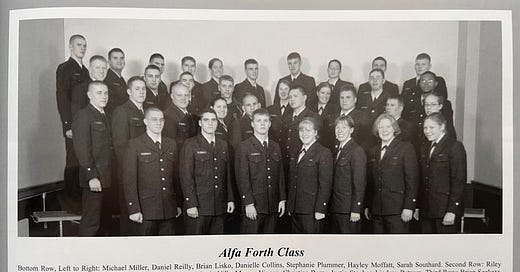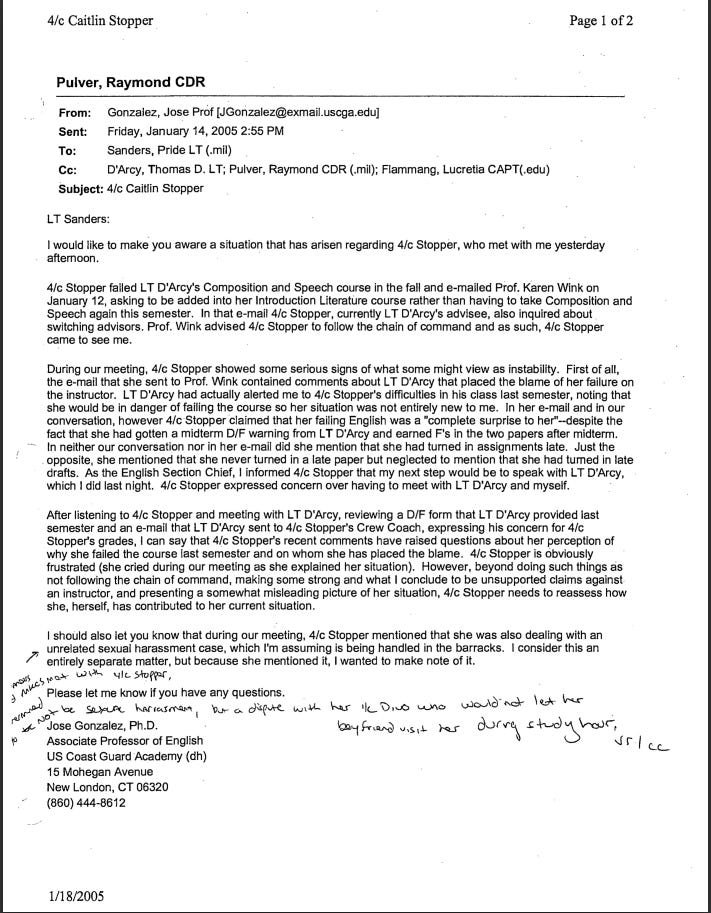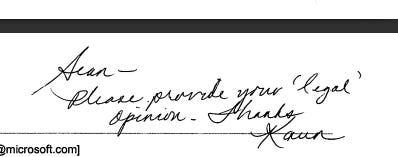Part II: Understanding The Coast Guard’s Use of Paralogizomai Through the Discardment of Cadet Caitlin E. Stopper
Read Part I of this series, The Chain of Command is the Problem.
Read my 2023 Senate testimony here and listen to my sworn Senate oral statement here.
The date is either 8 or 9 February 2005. I am alone in an office in Hamilton Hall on the Coast Guard Academy’s Campus in New London, CT. I am here because I’ve given up. In the midst of an investigation into my allegations of Sexual Assault and Sexual Harassment (SA/SH) against a fellow freshman cadet in Alfa Company, I lost the will to fight my Chain of Command for the dignity, fairness, and support that all cadets deserve. I am here to beg the Commandant of Cadets, CAPT Doug Wisniewski, to discharge me from the US Coast Guard in the middle of the investigation. My life depends on this immediate discharge as I have become suicidal.
This office must be a spare office because it is empty save for a desk, three chairs, and an empty bookcase. I’m told to sit down and wait. I have no notebook, no pen, or a cell phone. There is no lawyer with me, no SARC or SVC. CGIS isn’t here, either - in fact, I don’t know what CGIS is at this point. I am completely alone until the Commandant of Cadets, CAPT Doug Wisniewski enters with Alfa Company Officer, LT Pride Sanders. The two men are literal, physical opposites. Doug’s presence is overbearing; a white man well over 6’ tall, greying hair in all the right places, with an energy that tells me that he thrives in situations like this. Sanders, the man that just three weeks prior told me that he didn’t investigate my allegations because he figured the incident, “happened on a date” and that I “do have blonde hair and wear makeup” is a very short, very bald, black man that clearly resents the fact that I’m making his shore tour difficult for him.
“But don’t you want to stay and see the outcome of the investigation?” Doug asks. There was a sweetness to his tone that turns my stomach to this day.
“Sir, I just want to walk off campus. I won’t be a problem anymore, just let me leave, please, sir,” I beg through heavy sobs.
“You can’t just walk off campus,” he continues with that syrupy edge. His disdain for me is apparent, but he’s also enjoying himself. “You’d end up in a Court Martial for AWOL. No one wants that - lets do this the easy way; withdraw your academic appeal to the Admiral,” he responds far too casually. My heart sinks deep into my chest as quickly as a smile appears on his face. Its a smile that I will never forget. I still can’t look at the Cheshire Cat without thinking of Doug.
In desperation, I grabbed the life raft Doug threw at me, not knowing at the time that I was a pawn in a game I didn’t know I was expected to play. If I had known that I’d be expected to participate in Coast Guard Squid Games I would have taken any other NCAA scholarship that was offered to me just a few months ago. I am here because I naively wanted to serve my country in uniform.
With a strict template to follow, and LT Pride Sanders’s unyielding supervision over my shoulder, I wrote a memorandum on 9 February 2005 to the Superintendent, RADM Rube Olsen, withdrawing my appeal for academic deficiencies. Note how there is no mention of an ongoing SA/SH investigation in this memo. That was by design. I wasn’t permitted to mention it.
Right there, Dear Reader, is the birth of Doug’s Overstory about me, Cadet Caitlin Stopper.
The fact of the matter is that I was placed on academic probation for academic deficiencies in January of 2005. My grades were commensurate with any other SA/SH victim suffering from PTSD and still living in close proximity to her assailant. Instead of seeing my poor grades as a marker for a cadet in crisis, the adults in the room smelled blood in the water:
This email is what my original report of SA/SH on 14 Jan 2005 amounted to - a flippant remark at the end of an email to my chain of command. In this meeting, civilian Professor Jose Gonzalez asked what factors contributed to my poor academic performance in the interest of helping me to create an effective appeal. I broke down and told him the truth against my better judgment. It would end up being the biggest regret of my life.
[ Notes about this document: It is helpful to be aware of the high points of this study - namely avoidant coping - when trying to understand a PTSD-sufferer’s behavior.
Also note that I tried to meet with Professor Karen Wink first - a female civilian that had a reputation for being “friendly” in the female cadet grapevine. She turned me away and told me to follow my Chain of Command, the same Chain of Command that has historically been a problem as I explained in Part I of this essay series.
I also cannot explain LT Pride Sanders’ handwritten comments to Assistant Commandant of Cadets, CDR Raymond “Wes” Pulver at the bottom of the Gonzalez email. He never spoke to me about this - I can only surmise that they came from my 1/C cadet who was bullying me. For the record, my boyfriend was my lab partner for two subjects and he wasn’t permitted to study with me in the barracks. ]
Now armed with a voluntary resignation that makes no mention of SA/SH, the Chain of Command turned my story of SA/SH, bullying and retaliation into a story of a cadet looking for someone to blame for her academic failures. This was explicitly whispered in my ear during one of my final formations by the Firstie cadet in my chain of command. The Command had what they needed to erase the real reason why I begged for a discharge, but they wanted one final document to ensure its legality in the wake of Chang v. Navy which was filed less than a year prior. Wisniewski knew that I wouldn’t go quietly - and he was right - I ultimately got my Members of Congress involved later in the spring of 2005.
On or about 15 February 2005, sitting in the same empty office in Hamilton Hall, I am working through a large stack of discharge paperwork that I exchanged for a voluntary resignation that was acceptable to the Chain of Command. It is several inches thick. I’ll be here for a while, but that’s okay - I’d rather be here than inside the barracks. The paperwork consists of everything from a uniform return checklist to my DD214 - which I quadruple-check to be sure that it states ‘Honorable Discharge’. The way in which I have been treated the last few days had left me worried that it might state otherwise. LT Pride Sanders barges in and interrupts my work. He slips what I now understand to be a Privacy Act of 1974 Waiver right under my pen.
“You will sign this,” he states, leaning over me from across the desk.
“What is this?” I ask after reading it as carefully as I could. “I don’t understand.”
Exasperated, LT Sanders tells me through half-gritted teeth, “This allows us to answer questions about you if anyone ever inquires. You will sign this.”
“No, I won’t. I don’t feel comfortable signing that.”
LT Sanders now leans into me further, within 6” of my face, with fully gritted teeth, “You will sign this.” His anger is a terrifying blend of arrogance and disdain. He’s clearly afraid of whoever put him up to this. Stubbornly, I decide to refuse simply because he wants me to sign this - I’ve already signed my DD214 and don’t answer to him anymore. Real officers don’t lose their bearing, but Sanders did when faced with a stubborn 4/c cadet just trying to walk out the door.
“No,” I respond, looking him squarely in the eye for the first time in weeks. He then grabs the waiver and storms off; slamming the door behind him.
Only now do I understand, nearly 20 years later in October of 2024, how critical this interaction is to understanding how the USCGA Commandant of Cadets, CAPT Doug Wisniewski, weaponized law and Coast Guard policy and procedure against cadets that stood in the way of favorable statistics that would bolster his chances at making it to Admiral. They had their Overstory already, and they wanted me to sign something that would ensure that they could weaponize the law against me if I ever spoke out about what happened. I had surrendered enough. I wasn’t about to surrender my rights to a reasonable amount of privacy regarding the most traumatic events of my life. Ironically, speaking out about what happened to me publicly wasn’t on my radar until news of the Cadet Webster Smith General Court Martial hit the newscycle in February 2006.
In January of this year, I received a heavily redacted file through a FOIA request containing information related to the accusations of sexual assault and harassment that I made in 2005. I hate to call it a Report of Investigation (ROI) because that’s not necessarily an accurate description. The most accuarate description is dossier. It is a dossier on me. Of the 76 total pages, the first 14 pages are related not to my allegations or the administrative investigation, but to my academic performance. Why would nearly 20% of a SA/SH investigative file contain information about the victim’s academic performance?
My first clue was on Page 1 of my file:
The date here is critical - 19 Feb 2006 - one year and 4 days after I was discharged on 16 FEB 2005. This was also 4 days after news of the Webster Smith General Court Martial hit the front page of the local papers, and two days after I went public with my story. Doug Wisniewski’s own handwritten note is eerily telling: he, knowing that the “matter would linger”, was prepared to release the letter that he sent to my Congressman in 2005 to the Associated Press reporter, Matt Apuzzo, who was asking questions about my claims a year later in 2006. The problem that Doug faced was the Privacy Act - he couldn’t tell the media the Overstory he had written about me without my signed waiver.
While the first 14 pages of my dossier was about my academic performance, pages 29-44 are communications specifically related to whether or not the Coast Guard Academy could publicly comment on my claims of mistreatment. For those tracking, nearly 40% of my “ROI” was completely unrelated to the investigation into my allegations.
Though I’ve long-digested the facts of my story to the point where I’ve boiled down my Military Sexual Trauma (MST) and PTSD to a five minute oral statement, what I haven’t understood until recently is why the Command at the Coast Guard Academy in 2005 treated me the way that they did. Frankly, their treatment of me defies better judgment and logic. It's unbelievable if we’re being honest. For decades, even I questioned the facts of the matter because nothing added up - why would grown men treat a 19 year old cadet in crisis like trash to be taken out on trash day? Jesus’ own words in Luke 6:45 answers this and all of the questions we have about Operation Fouled Anchor:
“The good person out of the good treasure of his heart produces good, and the evil person out of the evil of his heart produces evil, for out of the abundance of the heart his mouth speaks.”
Read: the heart determines behavior
The Coast Guard failed by putting men like Doug Wisniewski, Wes Pulver, Pride Sanders and Jose Gonzalez in positions of authority at the US Coast Guard Academy in 2004 and 2005. What these men ultimately failed to do in their positions of influence over cadets was to honor the difference between authority and power. The consequence of the poor decision to put these men in charge is immeasurable; they were tasked with demonstrating to the Corps of Cadets who Captains, Commanders and Lieutenants should be in the United States Coast Guard. Instead, the Corps of Cadets learned how Squid Games are actually played in the service by leadership. They watched and they learned with sure certainty as key upcoming characters in this narrative were ultimately responsible for the outcome of the Whistler McGee tragedy down in Sector Mobile. The Last Class with Balls (1979) is clearly still influencing the Coast Guard today.
Part III of this series will demonstrate how, in 2005, the same Command retaliated against a female cadet rape victim for reporting her rape to the New London Police Department. The rapist, despite the Command determining that a rape did indeed happen, was allowed to walk off campus without consequence. That rapist is now a Senior Vice President in NYC and the physical evidence is missing.
All comments for this series will be turned off. You can contact Caitlin via email: cesmaro@protonmail.com.









